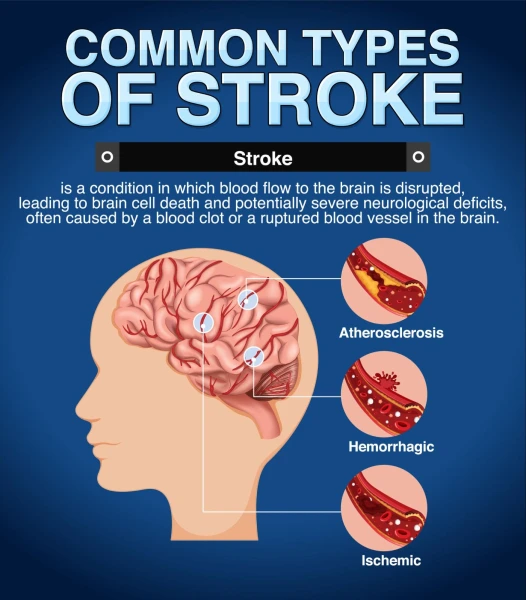Stroke is a leading cause of disability and death worldwide, making it a critical area of focus in neurology. A stroke occurs when blood flow to a part of the brain is interrupted or reduced, depriving brain tissue of oxygen and nutrients. This can lead to brain cell death and result in severe, often permanent, neurological damage. Given the serious consequences of a stroke, neurologists play an essential role in both managing stroke risk factors and implementing prevention strategies. Their expertise is pivotal in reducing the incidence of stroke and improving patient outcomes through early detection, risk assessment, and comprehensive care.
Understanding Stroke Risk Factors
Strokes are broadly categorized into two types: ischemic and hemorrhagic. Ischemic strokes, which account for approximately 87% of all strokes, occur when a blood clot obstructs an artery supplying blood to the brain. Hemorrhagic strokes, on the other hand, occur when a blood vessel in the brain bursts, leading to bleeding within the brain. Both types of stroke share common risk factors, many of which are modifiable.
Common stroke risk factors include:
- High Blood Pressure (Hypertension): The most significant risk factor for stroke, hypertension increases the pressure on arterial walls, which can lead to arterial damage, aneurysms, and increased risk of clot formation.
- High Cholesterol: Elevated levels of LDL cholesterol can lead to the buildup of plaques in arteries, a condition known as atherosclerosis, which can narrow arteries and increase the risk of ischemic stroke.
- Diabetes: Diabetes can damage blood vessels and increase the risk of clot formation, making stroke more likely.
- Smoking: Smoking damages blood vessels, raises blood pressure, and accelerates the process of atherosclerosis, significantly increasing stroke risk.
- Atrial Fibrillation (AFib): This irregular heart rhythm can cause blood clots to form in the heart, which can then travel to the brain and cause a stroke.
- Obesity: Being overweight increases the risk of hypertension, diabetes, and heart disease, all of which contribute to stroke risk.
- Sedentary Lifestyle: Lack of physical activity is associated with several risk factors for stroke, including obesity, high blood pressure, and diabetes.
- Unhealthy Diet: Diets high in saturated fats, trans fats, cholesterol, and sodium can contribute to the development of cardiovascular disease and increase stroke risk.
- Excessive Alcohol Consumption: Drinking too much alcohol can raise blood pressure and contribute to other stroke risk factors.
- Family History and Genetics: A family history of stroke or certain genetic conditions can increase an individual’s risk, although these factors are not modifiable.
The Neurologist’s Role in Stroke Prevention
Neurologists are at the forefront of stroke prevention, using their specialized knowledge to identify at-risk individuals, manage underlying conditions, and implement evidence-based prevention strategies. Their role in stroke prevention encompasses several key areas:
- Risk Assessment and Monitoring: Neurologists perform comprehensive assessments to evaluate a patient’s stroke risk. This includes reviewing medical history, conducting physical examinations, and ordering diagnostic tests, such as blood pressure measurements, cholesterol levels, and imaging studies like carotid ultrasounds or brain MRIs. By identifying risk factors early, neurologists can tailor prevention strategies to individual needs.
- Managing Hypertension: As the leading modifiable risk factor for stroke, controlling high blood pressure is a priority for neurologists. They may prescribe antihypertensive medications and recommend lifestyle changes such as reducing salt intake, losing weight, and increasing physical activity to lower blood pressure.
- Addressing High Cholesterol and Atherosclerosis: Neurologists work with patients to manage cholesterol levels through statins and other lipid-lowering medications. They also emphasize the importance of a heart-healthy diet and regular exercise to reduce atherosclerosis and the associated stroke risk.
- Diabetes Management: Effective management of diabetes is crucial in reducing stroke risk. Neurologists collaborate with endocrinologists and primary care providers to ensure patients with diabetes maintain optimal blood glucose levels, thereby reducing the likelihood of stroke.
- Smoking Cessation Programs: Neurologists strongly advocate for smoking cessation as a means of reducing stroke risk. They may refer patients to smoking cessation programs, provide counseling, or prescribe medications like nicotine replacement therapy to help patients quit smoking.
- Atrial Fibrillation Management: For patients with atrial fibrillation, neurologists play a key role in stroke prevention by managing heart rhythm and prescribing anticoagulants to prevent clot formation. These interventions significantly reduce the risk of stroke in individuals with AFib.
- Lifestyle Modifications: Neurologists educate patients on the importance of maintaining a healthy lifestyle to prevent stroke. This includes promoting regular physical activity, a balanced diet rich in fruits and vegetables, weight management, and moderation in alcohol consumption.
- Patient Education and Advocacy: Neurologists are committed to raising awareness about stroke risk factors and prevention strategies. They provide patients and their families with education on recognizing stroke symptoms, the importance of early intervention, and the long-term benefits of preventive care.
- Long-Term Monitoring and Support: Stroke prevention is an ongoing process, and neurologists provide continuous monitoring and support to ensure that patients adhere to prevention strategies and manage their risk factors effectively. Regular follow-up appointments allow neurologists to adjust treatment plans as needed and address any emerging risk factors.
Conclusion
Neurologists play a pivotal role in managing stroke risk factors and implementing effective prevention strategies. Through comprehensive risk assessments, targeted interventions, and patient education, neurologists help reduce the incidence of stroke and improve the long-term health outcomes of at-risk individuals. Their expertise in managing conditions like hypertension, diabetes, and atrial fibrillation, along with their commitment to promoting healthy lifestyles, makes them indispensable in the fight against stroke. By working closely with patients, neurologists not only prevent strokes but also empower individuals to take control of their health and reduce their overall risk.

